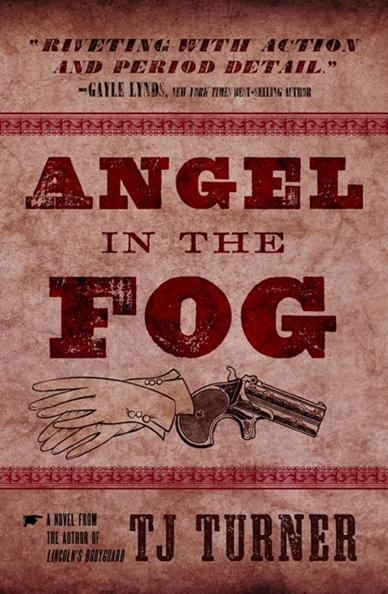 TJ Turner is an award-winning novelist, a historian, a research scientist, and a federal Agent. He has a PhD in Mechanical Engineering and Material Science from Cornell University. As a reserve military officer, he served three tours in Afghanistan and was awarded the Bronze Star Medal twice (2013 and 2017). Angel in the Fog is Turner’s third novel and a prequel to Lincoln’s Bodyguard and Land of Wolves. Turner’s novels have one won the Darrell Award for Best Mid-South Novel, the International Book Award for Historical Fiction, the Best Book Award for Historical Fiction, and the Military Writers of America Gold and Silver Medals. Turner lives in central Ohio, with his wife, Nancy, and three children. Like most authors, I’ve been writing a very long time. I’ve only known a few people who woke up one day, decided to start writing, and were good enough to get those early projects published. In fact, of the few authors I know who fall into this rarefied category of near super-human literary geniuses, I believe all of them (with the exception of one) regret how fast that early success came. That’s not to say that they aren’t grateful for the meteoric rise of their writing journeys, but most were at least slightly pigeon-holed into a genre, or a series, or something that built barriers to their development as a writer. In other words, they never had the chance to really struggle and define themselves through that struggle. So, the first thing I emphasize to any new writer I meet, or anyone years in and still trying to get published, is that the struggle is just as much a part of the creative process. I feel it’s an important part, and it’s ok to try new things, new genres, new characters, new writing styles, as you settle in on your own personal writing journey. I struggled. I still struggle, and I don’t fight it. The struggle forces me to develop and evolve, and I think that with each book my writing gets stronger, my stories get crisper, and my readers more drawn in to the world and characters I create. I started off writing short stories—science fiction. And they were horrible. I didn’t understand how a story arc should work. I didn’t understand how a character should grow and change. I tried to write very literary science fiction, which if it even exists, has got to be the smallest sub-genre in the world. My writing reflected my reading world at the time, limited to Isaac Asimov with the occasional jaunt into Robert Heinlein. It wasn’t until I started reading more widely and discovered just how much I loved fiction of every flavor—and non-fiction, too! I found myself drawn in by American history, alternating a novel (Cold Mountain, Enemy Women, The Things They Carry) with great non-fiction (Bury My Heart at Wounded Knee or Liar, Temptress, Soldier, Spy). It took me a while to realize that while I liked science fiction, I was curious about American History. That little word—curiosity—is so important. Andre DuBois III says it best—a writer needs authentic curiosity. (If you ever get a chance to see Andre talk about writing, jump at it, or look up the many YouTube videos where he talks about his creative process). What Andre means is that you as the writer will be living with this project for 6 months, or a year, or 3 years, and you have to not only be curious enough to start the work, but you have to be authentically curious enough to pull it all together and finish. Your story and your characters have to compel you to write, to drive you to the page so you can find out what happens to them. When that happens, all that passion will come out in your writing. So, I pivoted from science fiction to historical fiction—the literary equivalent of switching from basketball to ballet. And with the first words of that very first novel (LINCOLN’S BODYGUARD), I knew I had found my place—at least temporarily. It was a challenge to fit my story into actual history—to discover voices that might otherwise be lost and try to bring them to light. Unlike science fiction where I had to build a world from scratch, my world was laid out in the history texts we all know and love (?). I now had license to concentrate on my characters, and weaving in an interesting story through the fabric of American history. Even after finding my genre (or at least the one I’m writing right now), I’ve found there are still ways to grow as a writer. My first two novels were told in first-person with a male narrator. In some ways that was an easy out for me—someone to whom I could relate. But for my third book, I needed something different. In fact, my wife Nancy helped push me down this path. She wanted a book about Molly—my female protagonist. And I wanted a book my daughters could read and find a character they could draw inspiration from—a strong, intelligent female lead who not only lives but thrives in the male world of 1862 America. Even though I am biased, I think ANGEL IN THE FOG delivers upon that promise. I feel it’s my best writing yet, because I struggled outside my comfort zone. In truth, I was worried about creating a book with a female lead—to write authentically from Molly’s perspective. So, it may be unsurprising that the novel is told in third-person. That choice gave me a little distance between Molly and me as the writer. Some people have strong feelings on narrative point of view, but I like to think of them as tools. I use whatever the story needs. And so, with the publication of Molly’s story this April, I’ve turned to a new project—a female protagonist who is telling me her story in first person. This new character is pushing me even further, and hopefully an even better writer will emerge! Angel in the Fog Perfect for fans of espionage thrillers, historical fiction, and indefatigable female protagonists― Molly Ferguson’s comfortable life unravels when her Louisiana home is burned to the ground, her family murdered, and she is enslaved in a Baltimore brothel. Amidst the threat of the Civil War, Molly learns of secessionist plans to assassinate President-elect Abraham Lincoln as he makes his way to Washington for his inauguration. She’s manages to pass this information on to a Pinkerton agent posing as a client. Impressed with her fortitude and intelligence, the Pinkerton Agency arranges for Molly’s freedom and brings her under the tutelage of Mrs. Kate Warne, America’s first female detective. After they save Mr. Lincoln in Baltimore, Molly is sent by the Pinkerton Agency into the Deep South―where the Civil War now rages―a spy behind enemy lines. Molly threads a thin line between revenge and redemption as she races to unravel a sinister plan that will doom the Union and allow the Confederacy to win the Civil War―while coming face to face with the demons from her tragic past. Find TJ at his website, Facebook and Twitter Where to Pre-Order Angel in the Fog
0 Comments
Leave a Reply. |
AuthorI'm generally pulled in a million different directions and I wouldn't trade it for the world. Here's a glimpse of my life - hope you enjoy it! And if there's a big lapse between posts, well, that's the way life goes in Amy's world. Archives
October 2022
Categories
All
|
|
Copyright 2024 by Amy Rivers. All rights reserved. |
 RSS Feed
RSS Feed